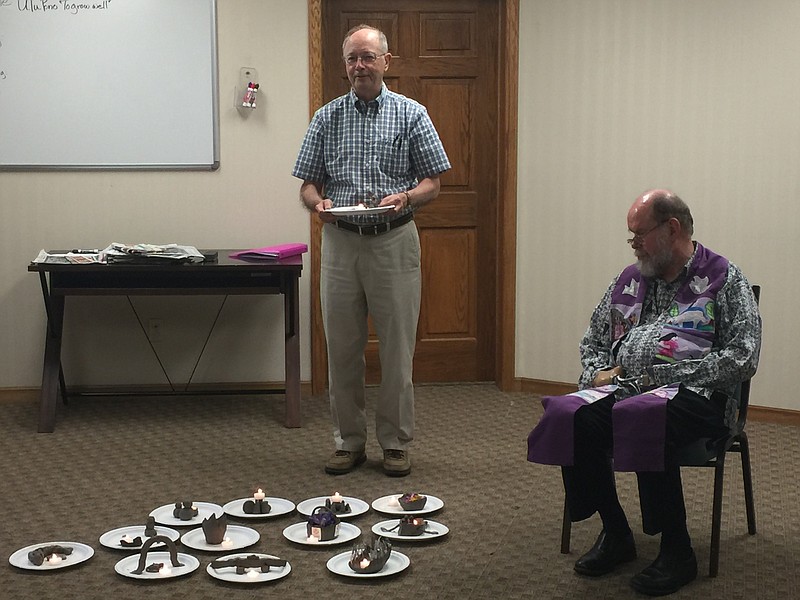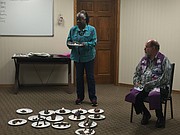If you go
› What: “Healing Our Memories, Healing of Our Community,” workshop with Father Michael Lapsley, founder of the Institute for the Healing of Memories› When: 9 a.m.-4 p.m. Saturday, Oct. 22› Where: Unitarian Universalist Church of Chattanooga, 3224 Navajo Drive› Admission: Free, public invited; limited to 15 participants› Registration: revharrington@mac.com or 231-301-3177› Information: 624-2985, na.healing-memories.org or healing-memories.org.
The woman's son had been killed 15 years before. She had come to the workshop in an effort to learn how to get beyond his death, to move on.
Almost immediately, she caught the attention of Father Michael Lapsley, who was running the workshop, designed by the Institute for Healing of Memories.
"It sounds horrible, but I noticed on the first night the ugliness of her face," he recalls. "When she told her story, it was as if the son had been killed just a few moments before. From the moment of his death, her life had stopped and she felt she owed it to him to keep hatred alive."
One of the goals of Healing of Memories, created in South Africa after the racist apartheid regime ended in 1994, is to reach out to those who have experienced violence - either as a victim or even a victimizer - and help them come to terms with their past and, hopefully, lessen its grip on their future.
When it came to the woman and her dead son, Lapsley asked whether her son would have wanted her to be engulfed in anger and grief.
"I asked her what kind of life did she think that her son would have wished for her," he says. "In the process of the workshop, she began not to forget him but to let him rest. On the last day of the workshop I could've walked straight past her because the lines of her face had actually changed and she looked radiant."
The work of Healing of Memories "is grounded in the belief that we are all in need of healing because of what we have done, what we have failed to do, and what has been done to us," Lapsley says. "We believe that all human beings are capable of being both perpetrators and victims and, even in some measure, both at the same time."
Lapsley will bring those beliefs and experiences to a workshop set for Friday through Sunday at the Unitarian Universalist Church of Chattanooga. The Rev. Cathy Harrington, minister at the church, says she hopes the event "will increase the community's understanding of the benefits of this approach to justice. "
And she had her own experience with shattering loss when her 26-year-old daughter was murdered in 2004.
"My own healing began when I was able to feel compassion for the mother of my daughter's murderer and I began to recognize the systemic injustice in our society that contributes to violence and I wanted to know how I can make a difference," she says. "I went back to school to work on a doctor of ministry degree with a focus on restorative justice and received my training as a victim outreach specialist in capital murder cases."
Lapsley also knows catastrophic loss. Moving from his birthplace in New Zealand to South Africa in 1973, he soon became a vocal opponent to apartheid in South Africa, eventually taking a job as chaplain to students at both black and white universities. Expelled from the country years later, he wound up in Zimbabwe by 1990.
One day he received a letter containing two religious magazines. In between the magazines was a bomb that blew off both his hands, blinded him in one eye and severely burned him. After recovering and with two artificial hands, he didn't stop his work on ending apartheid and two years later he returned to South Africa; he was still there when apartheid was overthrown in 1994.
In 1998, the Institute of Healing Memories was created and Lapsley now has carried its work to countries around the world.
"Our workshops give people space where they can explore the fullness of their humanity in its beauty as well as in its ugliness," he says.
"Pain is transcendent. When people share their life stories with one another with open hearts, they discover that it is the commonality of their pain which connects them most deeply."
He doesn't promise complete healing will come through the workshop in Chattanooga, but it's a start. It will be "one step on the road to healing," he says.
"If people are sharing something significant that happened in their lives for the very first time, it can turn out to be a life-changing step and one that breaks the chain that so often turns victims into victimizers," he explains.
However, while based on the same model, each workshop has an individual feeling all its own, he says.
"The uniqueness comes from the content of the stories that people share," Lapsley says. "While every story is unique, there is also commonality at the deepest level in the human family. This is true in terms of our feelings and the good and bad that we're all capable of as human beings."
Contact Shawn Ryan at sryan@timesfreepress.com or 423-757-6327.

